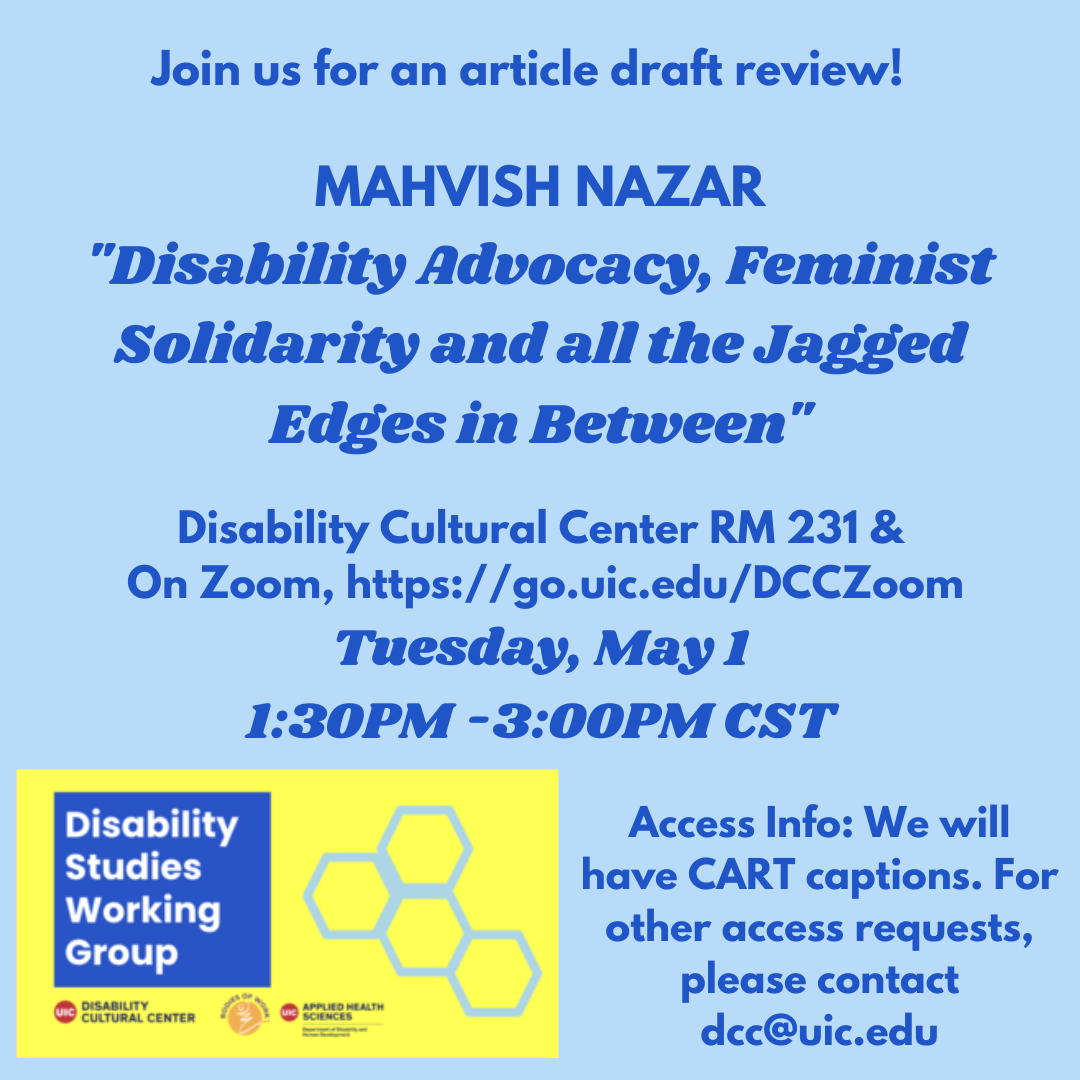Mahvish Nazar, “Disability Advocacy, Feminist Solidarity and all the Jagged Edges in Between”
Disability Studies Working Group
May 1, 2024
1:30 PM - 3:00 PM
Location
Disability Cultural Center, BSB 231
Address
1007 W Harrison, Room 231, Chicago, IL 60607
Calendar
Download iCal File
UIC Disability Studies Working Group
Join us to workshop an article draft with Mahvish Nazar,
"Disability Advocacy, Feminist Solidarity and all the Jagged Edges in Between"
The article draft will be available for advance reading at https://go.uic.edu/DSWorkingGroup
Access Info: Live captioning (CART) will be provided. For ASL and other access requests, please contact dcc@uic.edu
About the article:
Advocacy and solidarity often ask us to show and speak up in public against discrimination and oppression in very specific ways. More often than not, a good advocate is characterized by someone having fluency, legibility, good aesthetics and presence of mind to act swiftly when confronted with bigots and call them out. However, as feminist disability scholars have shown, these prerequisites shrink the category of what is considered as effective advocacy and who can carry it out compellingly. “Bed activism”, as proposed by Akemi Nishida and Leah Lakshmi Piepzna-Samarasinha show the potential and value in using constrained physical and emotional resources to build more inclusive practices of advocacy and have pushed the boundaries of what it means to do activist work. Informed by personal encounters, I take this work forward in a new direction by placing politics of fluency and legibility at the center of it.
In this paper, employing auto ethnography as my research methodology, I analyze my own personal experiences in a racist settler colonial state as a Muslim woman who stammers, what it has meant to face xenophobia and ableism both inside and outside the contexts of the novel coronavirus pandemic and how the material realities of my disability impact my self-advocacy. I also question my own internalized ableism which often stops me from advocating for myself in the moment and how it perpetuates and solidifies systemic oppression.
The questions I wish to explore are how norms around advocacy in the public sphere are challenged when multiple marginalized identities clash? How does one practice alternate forms of activism in moments where urgent, spoken action is the best or most efficient way to self-advocate in that situation? How does one cultivate self-care and self-love when internalized ableism threatens to shake the foundations of these very concepts? How does one seek out and practice crip solidarity in these instances of discrimination which happen in public, sometimes in the presence of friends, and yet leave one with feelings of isolation and alienation?
About the working group:
The Disability Studies Working Group at UIC offers a forum for sharing work in progress. Originally formed in 2018, the Disability Studies Working Group is a cross-disciplinary collective of researchers interested in disability studies and disability issues.
Our conversations have included conference papers, dissertation or manuscript chapters, article drafts, practice defenses and job talks, and "common reads" from disability studies. Students, faculty, postdocs, other UIC affiliates, and members of the community are invited to join, and scholarly work from across the disciplines is welcome- humanities, social sciences, health sciences, hermeneutic, qualitative, quantitative, theoretical, etc. The Disability Studies Working Group provides an informal environment for scholarly cross-pollination, and endeavors to offer members of the UIC disability studies community a welcoming and supportive space to practice, experiment intellectually, and receive feedback.
Contact the coordinator Sarah Williams with any questions at swill74@uic.edu
ID: Deep blue text on a pale blue background and a yellow and blue Disability Studies Working Group Logo, which features a light blue honeycomb shape.
Date posted
Apr 9, 2024
Date updated
Apr 9, 2024